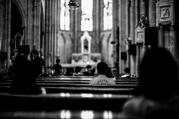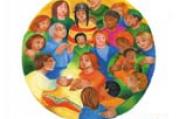Loading...
Click here if you don’t see subscription options
Click here if you don’t see subscription options

Of Many Things
Dulce et decorum est pro patria mori. "It is a beautiful honor to die for one’s country.” In this famous line, the Roman poet Horace gave lasting expression to an ideal of republican virtue inherited from an age when citizen soldiers defended their homeland against its enemies. Even

Editorials
The presidential campaign of 2004 promises to be the most expensive in U.S. history. Unfortunately, and not by accident, the most expensive presidential campaign in history also threatens to be the least enlightened. The enormous sums available to campaign organizations are for the most part investe

News
Judge Says Bishops Manipulated Review BoardThe head of the U.S. Catholic bishops’ National Review Board on sexual abuse by members of the Catholic clergy said on May 11 that a letter she wrote to the head of the bishops’ conference on March 29 prompted the U.S. bishops to decide they wil

FaithFaith in Focus
Catholic students are quick to talk about their experience of church—but what about their experience of Christ?

Editorials
On May 17, 1954, neither the nine justices of the U.S. Supreme Court, nor anyone else, could have predicted that 50 years later both the U.S. secretary of state and the president’s national security advisor would be African-Americans. But on that Monday morning, the court announced its decisio

News
Canon Law on Sanctions Leaves Much to Interpret People on one side ask why bishops don’t stop certain Catholic politicians from receiving Communion or even excommunicate them.Aren’t they openly defying church teaching on the most important subjectthe right to life? If such politicians do

With over one million employees, the Catholic Church in the United States is comparable in size to Wal-Mart, but it still follows a feudal model of governance and management. This may be adequate to protect religious orthodoxy, but it is not equal to the task of managing a worldwide enterprise that

In August 2003, thousands of tobacco-control and health advocates converged upon Helsinki, Finland, for the 11th World Conference on Tobacco or Health. I was the only “official” Roman Catholic attending. Three months later, in mid-December 2003, I attended the National Conference on Toba

News
Gregory: Denying Communion Over Abortion Is Last Resort"Denying Communion to a politician like Senator John F. Kerry, who supports legalized abortion, must be the last resort in a process to persuade the politician to uphold moral truths when voting," said the president of the U.S. Confere

What makes good liturgy? That is the question with which a squad of talented Catholic liturgists have been wrestling in the pages of America over the past nine weeks. Beginning with the most basic liturgical minister of allthe assemblythese men and women have probed the arts of presiding and preachi
